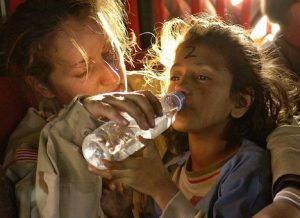Alice in Year 13 explores some of the possible links between aid and dependency, looking at the central issues relating to the giving of aid.

Aid is the money, food or other resources that are given or lent by one country to another, for the purpose of helping those in poverty or those who have been affected by disasters and need relief. However, it is often argued that this can result in welfare dependency which occurs when a person or household is reliant on the aid they have received or are receiving; potentially leading to the prevention of government accountability and development. This is because a household is theoretically less likely to become independent through actively seeking out work, education, or training if they have the support of organisations or the government to fall back on. The usefulness of aid varies for different events, often longer-term and materialistic or monetary assistance are thought to provoke higher levels of welfare dependency than shorter-term or more sustainable support.
Firstly, it is important to establish the definition of dependence and what would qualify a household to be in a state of dependency. Although this could be measured through the percentage of income that is derived from aid, other factors influence reliance as well, such as the extremity of the situation as only a small proportion could be needed to help a family in a crisis yet this assistance may be necessary for relief. On the other hand, aid could make up a large amount of a household’s income yet they may not necessarily be dependent as job availability and eligibility are also a significant factor in calculating a household’s dependence. However, Sharp et al. (2003) classifies destitution as ‘a state of extreme poverty that results from pursuit of ‘unsustainable livelihoods’, (…) they lack access to the key productive assets needed to escape from poverty, and they become dependent on public and/or private transfers’. This depicts dependency as a defining character of destitution, implying that because those who receive humanitarian action are often in an extreme state of poverty, they have to be dependent on it in order to receive it and therefore aid has to foster welfare dependency.
In addition to this, although dependency on aid may be seen as a defining feature for destitution despite subjective stances on whether recipients are dependent, the degree to which aid can be relied on is a completely different factor. Despite dependency being necessary to receive aid, realistically aid may not be the most useful way of supporting those in poverty or a crisis and therefore in actuality, beneficiaries are unable to rely on it. This varies depending on the organisation giving help and their transparency with the receivers as well as the regularity of its occurrence. For example, Harvey and Lind use a case study in South Sudan, where ‘relief deliveries have in general been too unreliable and inadequate for dependency, except in limited periods of acute emergency’, showing that the only time aid could be guaranteed was when the situation was extreme. In other times, the citizens would most likely have to rely on other sources of support as relief aid would be too irregular to be depended on.

As well as this, in a 2001 study of the drought in Eastern Africa by Erin Lentz and Christopher Barret, there was ‘no qualitative or quantitative evidence that the meagre amounts of food aid they received had an appreciable effect on their capacity to become self-reliant’. This, again, shows how organisations can lack transparency with their recipients as well as a possible lack of domestic knowledge of the country and investment due to concerns of public image over the well-being of the citizens in need. These cases are examples of when aid cannot physically be relied on either because of the little amount or low quality of the support or because of the short-term effect it had and varying circumstances that also play a part in the usefulness of aid.
In contrast to this, many studies where humanitarian assistance has been given to those in poor conditions or a crisis show that aid has helped to relieve victims of poverty and disasters and therefore were and can be relied on. According to Jeffery Sachs in The Guardian, ‘a growing flood of data shows that death rates in many poor countries are falling sharply, and that aid supported programmes for healthcare delivery have played a key role’. A study by Gabriel Demombynes and Sophia Trommlerova shows that Kenya’s infant mortality rate has decreases due to the up-take of anti-malaria bed nets that had been donated. As well as this, ‘malaria deaths in children in Africa were cut from a peak of around 1 million in 2004 to around 700,000 in 2010’. These statistics would suggest that healthcare ais is necessary for the survival of those at risk to diseases and therefore are depended on by many people.

However, the allocation of aid is also important to factor in when considering how dependable households are on foreign aid. For example, in Afghanistan the ability for aid agencies to communicate with women was restricted during the Taliban period due to the patriarchal society, reducing their reliability on it. Other factors that determine whether groups can rely on foreign aid also include local power dynamics and hierarchies, for people to be able to depend on aid it is important that those distributing it are not corrupt, or have a bias over certain households. In Ethiopia, the distribution of aid was decided by local-level authorities who often allocated support equally throughout the community, lessening its effectiveness on those who may have needed it more than others. This is shown in Dawunta Delant, a region in Ethiopia, where some recipients claim that poorer households may not have received as much assistance as others due to their disconnection with local leaders, ‘aid is provided to wealthy people. We poor receive a small ration. The aid comes in the name of the poor of our community but the poor do not receive the aid’, depicting how those who need aid cannot rely on it since only a small portion is given.
Food aid is also often seen to cause a high level of reliance from the beneficiaries. Again, this is because the provision of food can sometimes act as a replacement for locally sourced food, leaving local businesses with less revenue and customers as well as a disincentive for farmers to work if food will be provided for them. In Ethiopia, food insecurity is a persistent problem due to the unreliable rainfall patterns and low irrigation levels, leaving a large proportion of Ethiopians (an estimated 4.6 million) relying on food aid. Aschale Dagnachew Siyoum has associated this with the ‘dependency syndrome’, and the idea of ‘aspiration failure’ where there is ‘the lack of systematic pro-active effort to better one’s future’. The head of the District Agricultural Office explains that ‘due to availability of food aid for many years, farmers have developed a dependency syndrome and have become reluctant to improve their lives. As a consequence, they are not willing to use their potential to improve their livelihood by themselves.’ However, interviews with the recipients of food aid also shows that the assistance was not enough to be able to depend on, showing the lack of reliability. One household claimed that ‘the amount of food aid that we have been receiving was not enough to cover our food gaps and we always have to supplement our income from other sources’, furthermore, 65% of the households that were surveyed depended upon ‘the sale of productive assets like livestock and credit to cover consumption gaps in times of need’. This suggests that rather than having a ‘dependency syndrome’, where farmers and families are reluctant to work, they use the aid to complement other activities as it is not enough to depend on alone.
As a result, for the majority of cases aid does not cause the recipient to become dependent due to its unreliability and the insufficiency of the amount given. Although in some circumstances aid can be relied on which would arguably make the beneficiaries dependent, many would suggest that rather than becoming reliant on this aid, receivers are instead only using this aid to complement other activities in order to become self-sufficient in the future.

